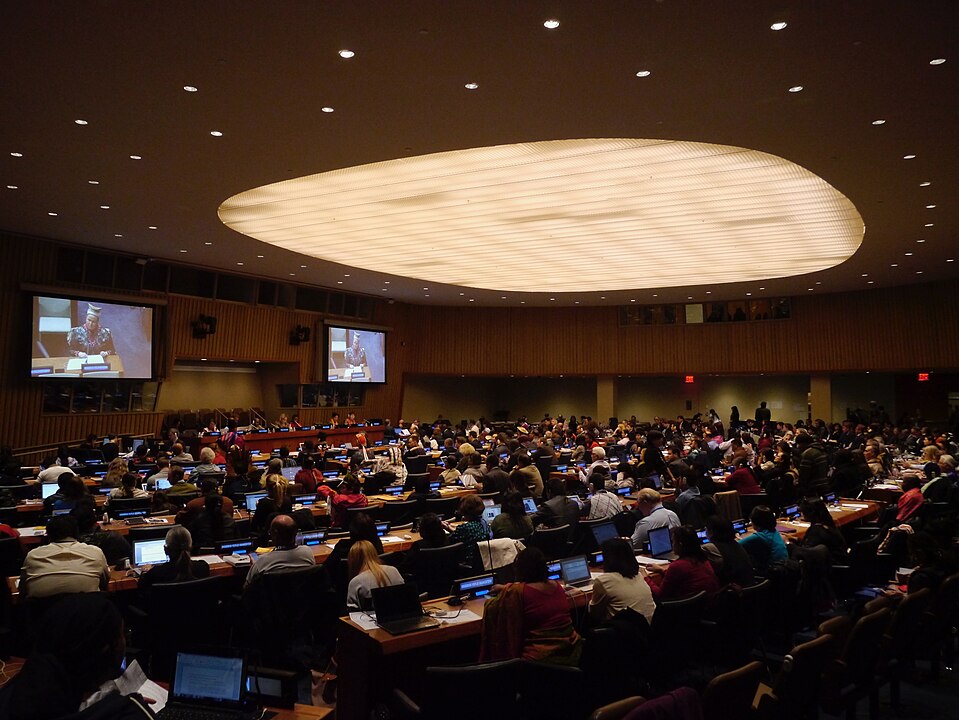
Plenary meeting of the UN Permanent Forum on Indigenous Issues, held at United Nations Headquarters in New York, 2015. Carwil Bjork-James / Wikimedia Commons, CC BY-SA 4.0.
An example of “bottom-up” multilateralism
Juliette Prunier is a student in the Peace, Humanitarian Action and Development Masters program at Sciences Po Lille, specializing in the study of conflict management and development issues.
Established by the resolution 2000/22, the UN permanent forum on Indigenous Issues (UNPFII) is one of the main tools used by the United Nations to promote indigenous rights, and put them in the international agenda. Inhabiting no less than 22% of our planet’s land, indigenous populations comprise between 370 to 500 million people. Threatened by constant marginalization and human rights abuses, they gathered together and yearly participated in the UNPFII. This is a high-level advisory body to the Economic and Social Council (ECOSOC), which provides recommendations, programs, and funds on indigenous issues. Its missions are twofold: to raise awareness of indigenous rights and to follow up the full application of the UN Declaration on the Rights of Indigenous Peoples (UNDRIP).
The UNDRIP : UN’s reference for the respect of the rights of indigenous peoples
This Declaration, which became a turning point for the Permanent Forum, was adopted by the UN General Assembly in 2007. The UNDRIP asserts that indigenous peoples have the right to pursue their own internal self-determination (art. 3) and that on the basis of this right they are free to determine their political status and economic, social, and cultural development. In addition, it states that indigenous peoples can’t be displaced from their lands. While the Declaration became the UN’s reference for the respect of the rights of indigenous peoples, it still has no binding effect in international law, as it is just a soft and symbolic law.
A multilateral space for the expression of indigenous people
Held for the first time in 2002, the forum has the mandate over six areas related to indigenous issues: economic and social development, culture, environment, education, health, and human rights. Apart from those mandates, each session is thematically focused on a specific issue, which reflects the forum’s ability to cope with current challenges.
Undoubtedly, the forum’s approach is multilateral for several reasons. First, it gathers hundreds of peoples from different states and political and socio-economic backgrounds. Despite those differences, the Forum encourages the reach of a compromise and the creation of a “we” composed of different “I”. Its impact has been positive insofar as,, after a decade of negotiations, it contributed to the development of a consensus with the UNDRIP in 2007, even though some states were (and still are) reluctant to recognize First Nations’ self-determination and territorial rights: New Zealand, Australia, the United States, and Canada. However, the latter changed its position in 2016, after the election of Prime Minister Justin Trudeau, supported by Indigenous people. That year, the Canadian Minister of Aboriginal and Northern Affairs announced Canada’s full support on Indigenous issues.
The forum, therefore, appears to be a space for indigenous people to express themselves and to be heard on the international scene, even before they are heard at the national level.
According to Irène Bellier, researcher at the CNRS, they have gone from being “victims” on the local scene to become “actors” on the international stage.
A bottom- approach to reach unity in difference
The UN provides a generic definition of Indigenous, so that they can identify themselves in a singular and chosen manner. During the adoption of the Declaration in 2007, a decision was made that it should be up to the nations to identify themselves or not with the definition of Indigenous. The Declaration thus embodies a powerful rhetoric affirming a global identity for indigenous people, while allowing them to assert their particularities. Indeed, the Declaration has been translated into several non-official languages and the Permanent Forum allows indigenous to speak up on their language, dressed with or without their traditional clothes.
To sum up, this bottom-up integration into the international system is not done by the assimilation of western values but by the search for common points on the basis of differences. For Irène Bellier, cultural diversity is demonstrated all over the Forum (i.e. Papuans coming with their spears, Chilian Mapuche bringing their sacred drum).
Another tool to reach consensus among the indigenous representatives is the limited time they are given to speak, as the summit only takes place for 10 days each year. As a result, delegations are encouraged to group under the same claims to increase their speaking time, and NGOs, also attending the Forum, may sometimes give the floor to indigenous representatives.
Ultimately, the UN Permanent Forum on indigenous issues reflects the emergence of a bottom-up multilateralism, which brings together not only states but also civil society actors. That said, the indigenous representatives attending the Forum are already familiar with the international UN system and necessarily maintain good ties with their own State. Marjo Lindroth, a specialist on indigeneity at the University of Lapland, raises the paradox that Indigenous people interact at the UN Forum within a non-Indigenous political system based on state sovereignty, which they are simultaneously fighting. Moreover, while many discussions have taken place over the past twenty years between indigenous peoples, NGOs and states, the Forum has only symbolic force and cannot impose anything binding to defend the rights of indigenous peoples. In fact, the criticisms addressed to the UNPFII could be extended to the very concept of multilateralism: can the search for consensus and the will to act be compatible?
Juliette Prunier , "The UN Permanent Forum on Indigenous Issues. An example of “bottom-up” multilateralism". Décryptage de l'actualité [en ligne], 19.07.2023, https://observatoire-multilateralisme.fr/publications/the-un-permanent-forum-on-indigenous-issues-unpfii/
